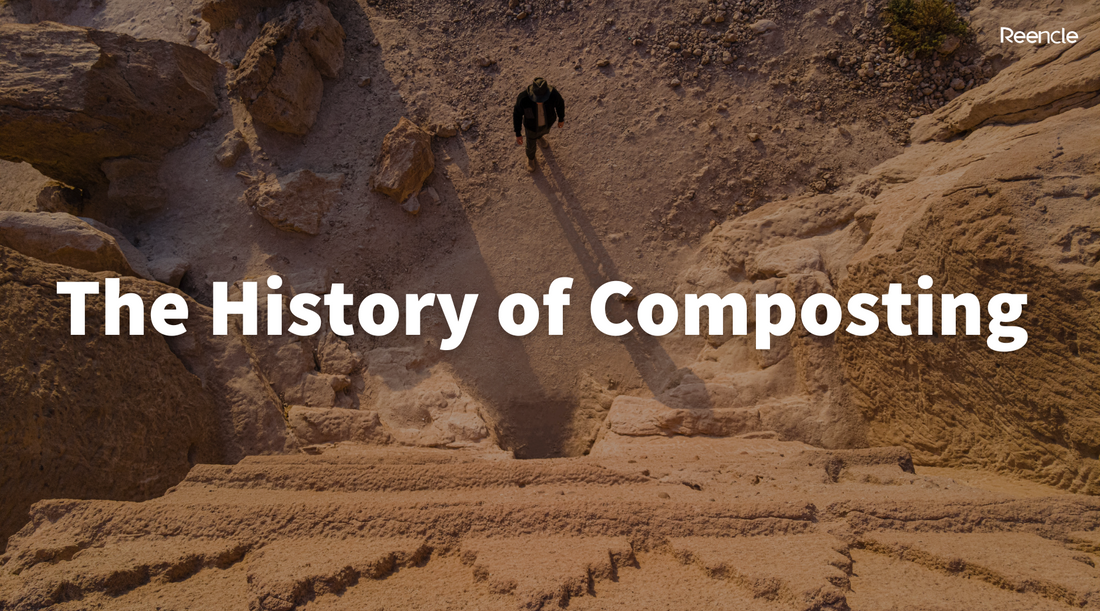Composting has been practised by civilizations for thousands of years. From ancient agricultural societies to modern eco-conscious movements, composting has remained a sustainable solution for managing organic waste over the years. In this article, join us as we delve into the fascinating history of composting. We will be highlighting its origins, evolution, and impact on our environment.

Ancient Beginnings: Unveiling the Roots of Composting
The roots of composting go back to ancient times when our ancestors recognized the transformative power of decomposing organic matter in agriculture. Historical records show that as early as 2,000 B.C., the Akkadians in Mesopotamia used compost to enhance crop yields. By combining a mix of animal manure, plant residues, and other organic materials, they created a fertile soil amendment that replenished nutrients and supported agricultural growth.
Composting was also an integral part of farming practices in ancient China. The Chinese discovered profound benefits when they combined organic waste such as food scraps and crop residues with soil. They quickly recognized that the cycle of decomposition was able to replenish nutrients and promote healthy plant growth.

Medieval Europe: The Agricultural Renaissance
During the Middle Ages, Europe experienced a renaissance in agricultural practices. Monasteries played a significant role in advancing composting techniques, using their vast gardens to experiment with organic waste management. Monks understood that composting not only enriched the soil but also reduced waste accumulation, fostering a more sustainable way of life.
One notable figure in composting history is Sir Albert Howard, an English botanist and agricultural scientist. In the early 20th century, Howard developed the Indore method of composting, named after the city in India where he conducted his research. This method involved layering animal manure, plant materials, and soil in specific ratios to accelerate the decomposition process. Howard's work revolutionized modern composting and laid the foundation for organic farming practices worldwide.

Composting in the Modern Era: Embracing Sustainability
The emergence of environmental movements in the 1960s and 1970s spurred renewed interest in composting as a sustainable waste management practice. As awareness grew about the detrimental impacts of landfills and synthetic fertilizers on ecosystems, composting became an attractive alternative that reduced waste, conserved resources, and revitalized soil health.
Municipal composting programs gained popularity across the globe, with cities recognizing the economic and ecological advantages of diverting organic waste from landfills. Composting facilities and community composting initiatives flourished, enabling individuals and businesses to actively participate in the composting process.

Like with anything else, looking back on the history of composting is valuable and important. Looking back not only reminds us of how far something has come, but also shows us how much there is to learn about composting. The knowledge we have now, has been passed down for thousands of years. Composting goes beyond just an activity to reduce food waste. It's a practice that connects people from across the world, across such vast times.
We practice composting to save the earth, reduce food waste, and give our plants the best. Whatever your reason may be, we hope you join us in our fight against food waste through the practice of composting.
If you'd like to do it with us with ease, we take the best parts of traditional composting and make it automatic with Reencle.
Save RM600 on your Reencle pre-order today when you sign up for our newsletter at www.reencle.my. Don’t forget to check your email for an exclusive discount code and apply this code at checkout to redeem your RM600 discount.
If you have any questions, please feel free to reach out to us on Instagram or Facebook and we’d be happy to help.

